What is HVAC Maintenance and Why is it Important?
HVAC maintenance refers to the regular upkeep and inspection of your heating, ventilation, and air conditioning (HVAC) systems. This process ensures that your HVAC unit operates efficiently, helps extend its lifespan, and reduces the likelihood of costly repairs. By scheduling professional maintenance, you ensure that your system runs smoothly, providing comfort and safety in your home or business environment.
HVAC maintenance involves a series of tasks designed to keep the system working at optimal performance levels, such as cleaning filters, checking refrigerant levels, inspecting electrical connections, and more. Whether you’re using your HVAC system for cooling during the summer or heating during the winter, regular maintenance plays a key role in keeping your system reliable year-round.
Understanding HVAC Maintenance
HVAC maintenance is more than just checking if your system turns on or off. It’s a thorough inspection of all the critical components, including:
- Filters: Air filters trap dust, dirt, and allergens from the air, so regular cleaning or replacement is essential to maintain airflow and ensure healthy indoor air quality.
- Coils: The evaporator and condenser coils collect dirt over time, which can cause your system to work harder and consume more energy. Cleaning the coils improves the efficiency and prolongs the life of your HVAC system.
- Condensate Drain: The condensate drain carries excess moisture from the system. If it becomes clogged, it could lead to water damage or reduced system efficiency. Regular maintenance ensures the drain is clear and functioning properly.
- Refrigerant Levels: Low refrigerant can cause cooling issues and may even damage the compressor. A professional maintenance service checks and refills refrigerant if necessary to maintain system performance.
- Thermostat Calibration: If your thermostat is not properly calibrated, your HVAC system may not be able to maintain the right temperature. Ensuring proper calibration helps maintain a comfortable indoor climate and avoids energy waste.

By regularly maintaining all these components, your HVAC system will run more efficiently, leading to lower energy bills and improved comfort. It also reduces the likelihood of unexpected breakdowns and costly emergency repairs.
The Importance of Regular HVAC Maintenance for Efficiency and Longevity
Regular HVAC maintenance provides several key benefits:
- Increased Energy Efficiency: When your HVAC system is properly maintained, it runs more efficiently. This results in less energy consumption, which lowers your energy bills. Dirty filters, coils, and ducts can reduce airflow and make your system work harder, consuming more energy. Regular maintenance ensures everything is clean and functioning as it should.
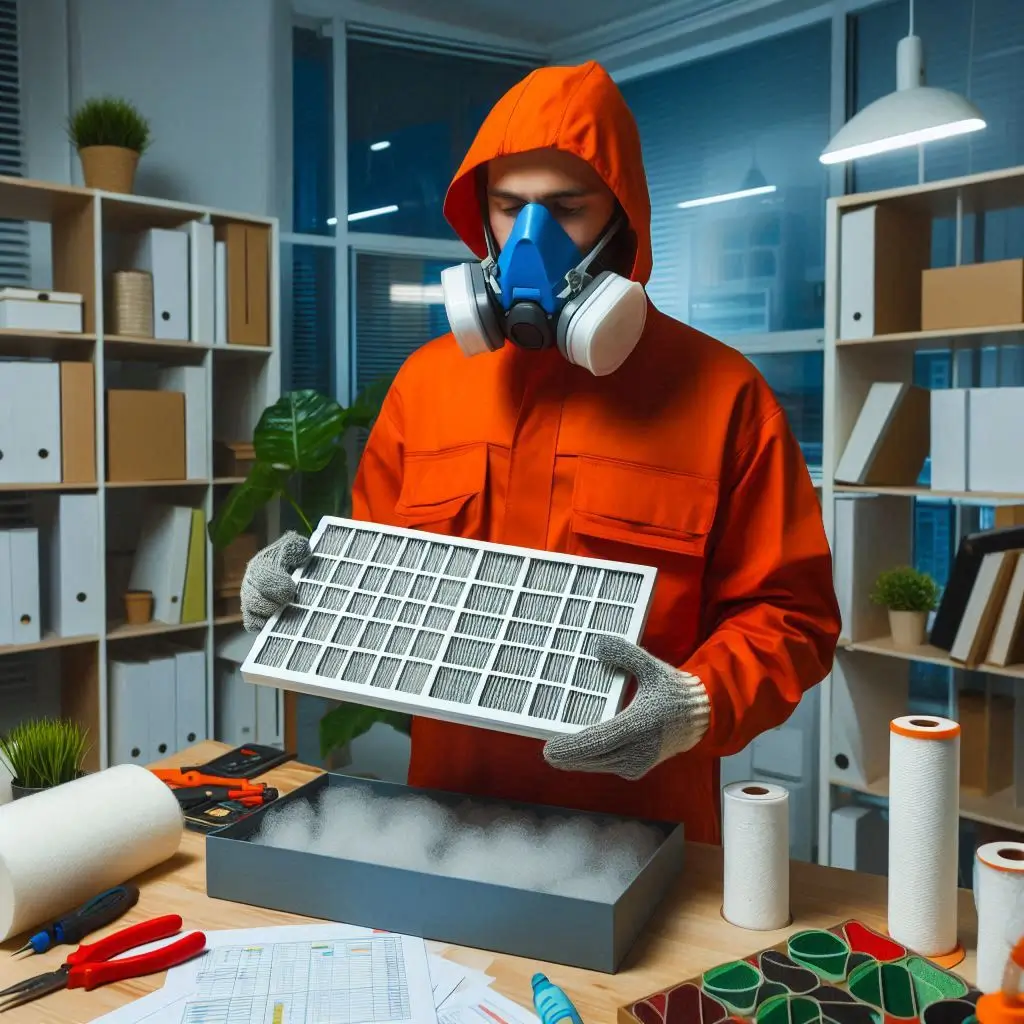
-
Improved Indoor Air Quality: Air filters and ducts accumulate dirt and debris over time, which can negatively impact the air quality in your home or office. Regular maintenance includes cleaning these components, improving airflow, and ensuring that the air circulating through your HVAC system is clean and healthy.
-
Extended System Lifespan: HVAC systems are a significant investment, and regular maintenance helps to protect that investment. By catching small issues early, before they escalate into larger problems, you can extend the lifespan of your system. The better your system is maintained, the less likely you are to experience a costly replacement before its expected lifespan.
-
Reduced Repair Costs: A well-maintained HVAC system is less likely to break down unexpectedly. By identifying and addressing potential problems early, HVAC maintenance helps avoid costly repairs or replacements down the road. It also keeps your warranty intact, as many warranties require regular professional maintenance to remain valid.
-
Improved Comfort: Regular maintenance ensures that your HVAC system is performing at its best. Whether it’s heating your home in the winter or cooling it in the summer, an efficient system maintains a consistent temperature, contributing to overall comfort. You’ll also avoid uncomfortable temperature fluctuations, strange noises, or poor air quality.

How to Find Reliable HVAC Maintenance Services Near You
When it comes to finding the right HVAC maintenance services, location, reliability, and expertise are all important factors. Locating a trustworthy and experienced service provider near you ensures that your HVAC system receives the best care, improving its performance, lifespan, and energy efficiency. Whether it’s routine maintenance or an emergency repair, choosing a reliable HVAC provider ensures peace of mind and long-term benefits for your heating and cooling systems.
In this section, we’ll explore how to search for local HVAC maintenance services and what key factors to consider when making your selection.
Searching for Local HVAC Maintenance Providers
The first step to finding the best HVAC maintenance provider is conducting a thorough search for local service providers. Start by using search engines and online platforms to find HVAC companies near you. Here are a few steps to guide your search:
-
Use Search Engines: Start by typing keywords like “HVAC maintenance near me” or “local HVAC maintenance services” into search engines like Google. This will give you a list of providers in your area, complete with contact information, customer reviews, and ratings.
-
Check Review Sites: Websites like Yelp, Angie’s List, and Better Business Bureau (BBB) provide ratings and reviews of local HVAC companies. These platforms allow previous customers to share their experiences, giving you insights into the company’s reputation and service quality.
-
Ask for Recommendations: Ask family, friends, and neighbors for recommendations. Word-of-mouth referrals from trusted sources can lead you to reliable, experienced providers. You can also check local community groups and social media platforms for suggestions.
-
Visit Company Websites: Look at the HVAC company’s website for more details. A professional website provides information on services, pricing, and customer testimonials, which can give you a better understanding of what the company offers. Make sure to check the “About Us” and “Contact Us” sections to verify their legitimacy and contact details.
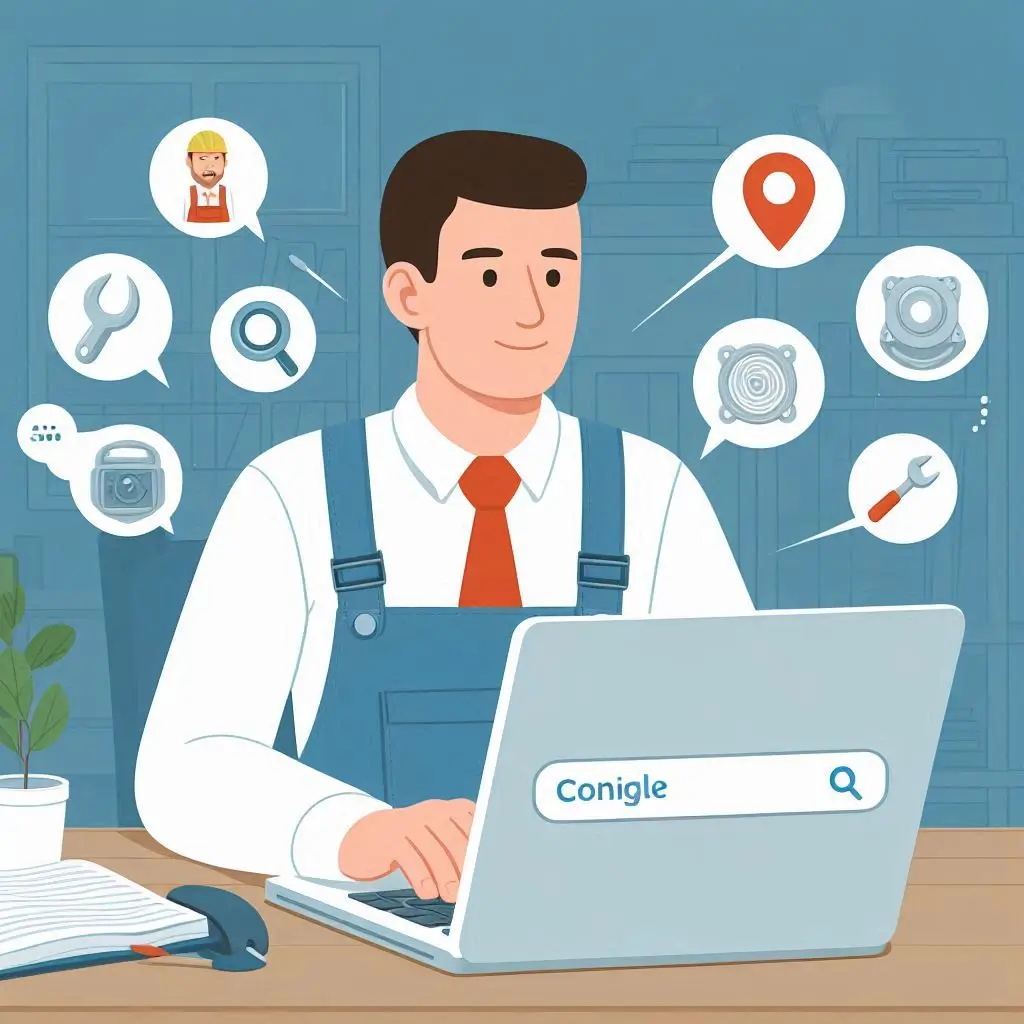
By gathering information from multiple sources, you can narrow down your options to a few providers in your area. This will give you a better idea of the HVAC companies that are available to meet your needs.
Key Factors to Consider When Choosing an HVAC Service Provider
When selecting an HVAC maintenance provider, it’s important to evaluate their qualifications, services, and reputation. Here are key factors to consider before making your decision:
-
Licensing and Certification: Ensure the HVAC service provider is licensed and certified to operate in your area. This guarantees they have the necessary training and expertise to perform maintenance and repairs safely and effectively. Look for certifications like NATE (North American Technician Excellence), which shows that the technician is highly skilled and knowledgeable.
-
Experience and Reputation: Consider how long the company has been in business and what kind of experience they have. Companies with years of experience in HVAC maintenance are more likely to provide reliable and high-quality service. Additionally, check online reviews and testimonials to ensure they have a good reputation with customers.
-
Range of Services Offered: Make sure the HVAC provider offers the services you need, such as routine maintenance, system inspections, and emergency repairs. A well-rounded HVAC service company can handle a variety of issues, saving you time and effort in the future. Also, inquire whether they offer maintenance plans or annual service contracts for regular upkeep of your HVAC system.
-
Pricing and Transparency: Look for providers who are transparent about their pricing and offer upfront quotes. Avoid companies that provide vague or fluctuating pricing, as this can lead to unexpected costs. Compare pricing from different providers to ensure you’re getting a fair deal. Be sure to ask about any discounts, warranties, or guarantees they offer for HVAC maintenance services.
-
Emergency Services: HVAC systems can break down unexpectedly, especially during extreme temperatures. Choose a provider that offers emergency services and has a quick response time. This ensures that you have support when you need it most, particularly if your heating or cooling system fails in the middle of summer or winter.
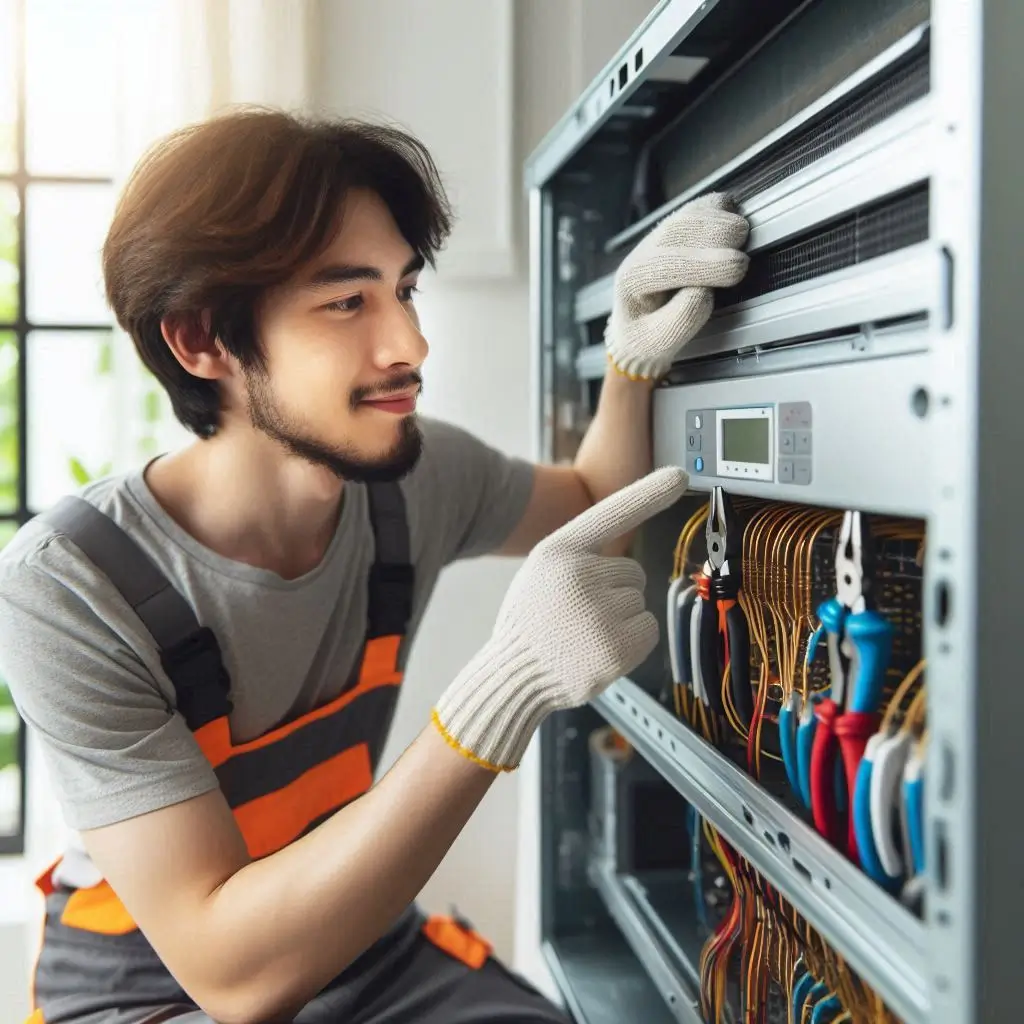
-
Customer Support: Reliable customer service is essential for a smooth experience. Ensure the HVAC company offers good customer support, responds promptly to inquiries, and provides clear communication. A company that values customer satisfaction is more likely to provide high-quality service and be responsive in case of issues.
-
Insurance Coverage: Confirm that the HVAC company is insured. Insurance protects both you and the technicians in case of accidents or damage during maintenance or repair work. It’s always best to hire a company that’s fully insured to avoid any liability.
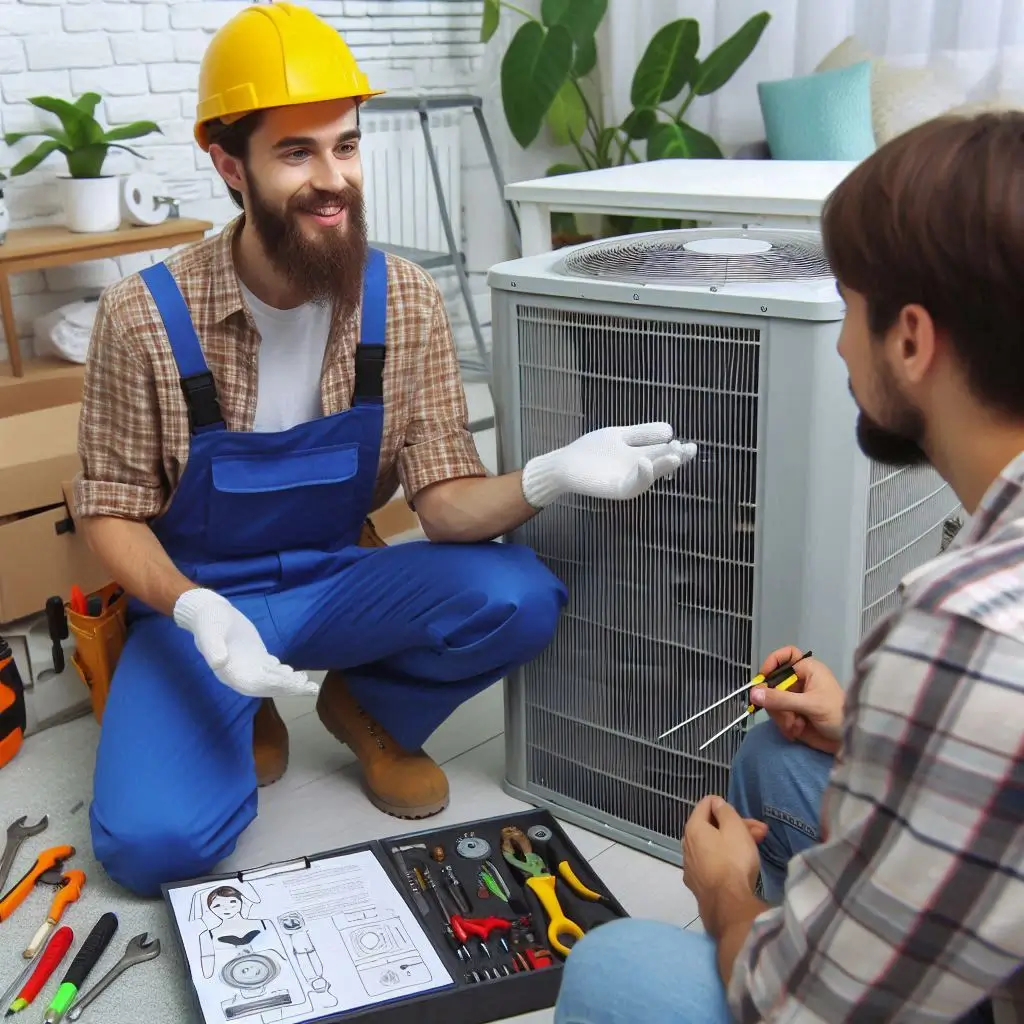
Benefits of Professional HVAC Maintenance in Your Area
Professional HVAC maintenance offers numerous benefits for homeowners and businesses alike. Ensuring your system is regularly maintained not only improves its performance but also enhances energy efficiency, indoor air quality, and comfort. In this section, we’ll explore some of the key advantages of professional HVAC maintenance that make it a wise investment for your home or business. Regular maintenance helps your HVAC system run efficiently, saves on energy costs, and prevents costly repairs down the line.
Increased Energy Efficiency
One of the most significant benefits of professional HVAC maintenance is improved energy efficiency. Over time, HVAC systems can become less efficient due to dust, debris, and wear on key components. Regular maintenance ensures that your system operates at peak performance, which can significantly reduce energy consumption and lower utility bills.
How Professional Maintenance Improves Energy Efficiency:
-
Cleaning and Replacing Air Filters: Dirty or clogged filters restrict airflow and make the HVAC system work harder. This reduces efficiency and increases energy consumption. Regularly cleaning or replacing the filters ensures proper airflow, allowing the system to operate efficiently.
-
Cleaning Coils and Condensers: Dust and debris can accumulate on the evaporator and condenser coils, reducing the system’s ability to absorb and release heat. Cleaning these components during routine maintenance ensures that the HVAC system runs efficiently, minimizing energy use.
-
Proper Refrigerant Levels: Low refrigerant levels can cause the HVAC system to operate inefficiently, as the system has to work harder to cool or heat the air. HVAC maintenance includes checking and recharging refrigerant levels to ensure that the system runs optimally, saving energy in the process.
-
Duct Inspection and Sealing: Leaky ducts can lead to air loss, causing your HVAC system to work harder to maintain the desired temperature. Sealing and insulating ducts during professional maintenance ensures that air flows smoothly, reducing the energy needed to cool or heat your space.
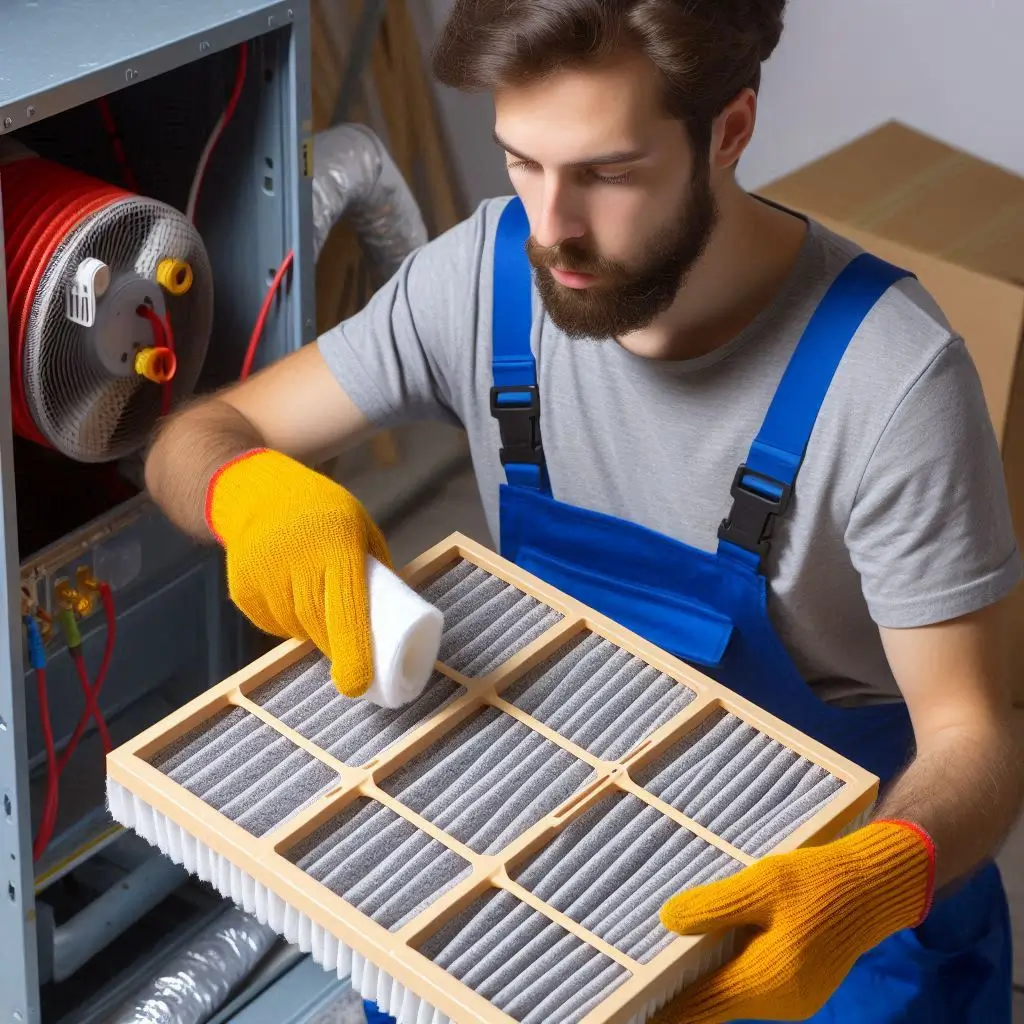
By addressing these areas during regular maintenance, your HVAC system uses less energy to provide the same level of comfort, ultimately reducing your monthly energy costs. This results in long-term savings and a more eco-friendly home or business.
Improved Indoor Air Quality and Comfort
In addition to improving energy efficiency, professional HVAC maintenance also leads to better indoor air quality and overall comfort. HVAC systems play a crucial role in filtering and circulating air, and keeping them well-maintained helps ensure the air in your home or business is clean and healthy.
How Regular HVAC Maintenance Enhances Air Quality and Comfort:
-
Cleaning Air Ducts: Over time, dust, dirt, and allergens accumulate in the air ducts. When the HVAC system is running, these particles can be blown into the air, affecting the quality of the air you breathe. Professional HVAC maintenance includes cleaning the ducts, removing any buildup, and ensuring clean, fresh air circulation throughout your home or office.
-
Replacing Filters: Air filters trap dust, pollen, pet dander, and other allergens. A clogged or dirty filter can’t perform this function effectively, leading to poor indoor air quality. Replacing the filters during HVAC maintenance ensures that allergens and dust are properly filtered, promoting cleaner air and a healthier indoor environment.
-
Humidification and Dehumidification: Maintaining proper humidity levels in your home is essential for comfort and health. HVAC maintenance includes checking and adjusting the humidity settings, ensuring the system provides a comfortable and healthy environment. This helps prevent issues like dry skin, respiratory problems, or excessive moisture that can lead to mold growth.
-
Temperature Consistency: A well-maintained HVAC system provides more consistent temperature control. It reduces the chances of hot or cold spots in your home, providing even, comfortable temperatures year-round. This is particularly important for larger homes or businesses with multiple rooms.
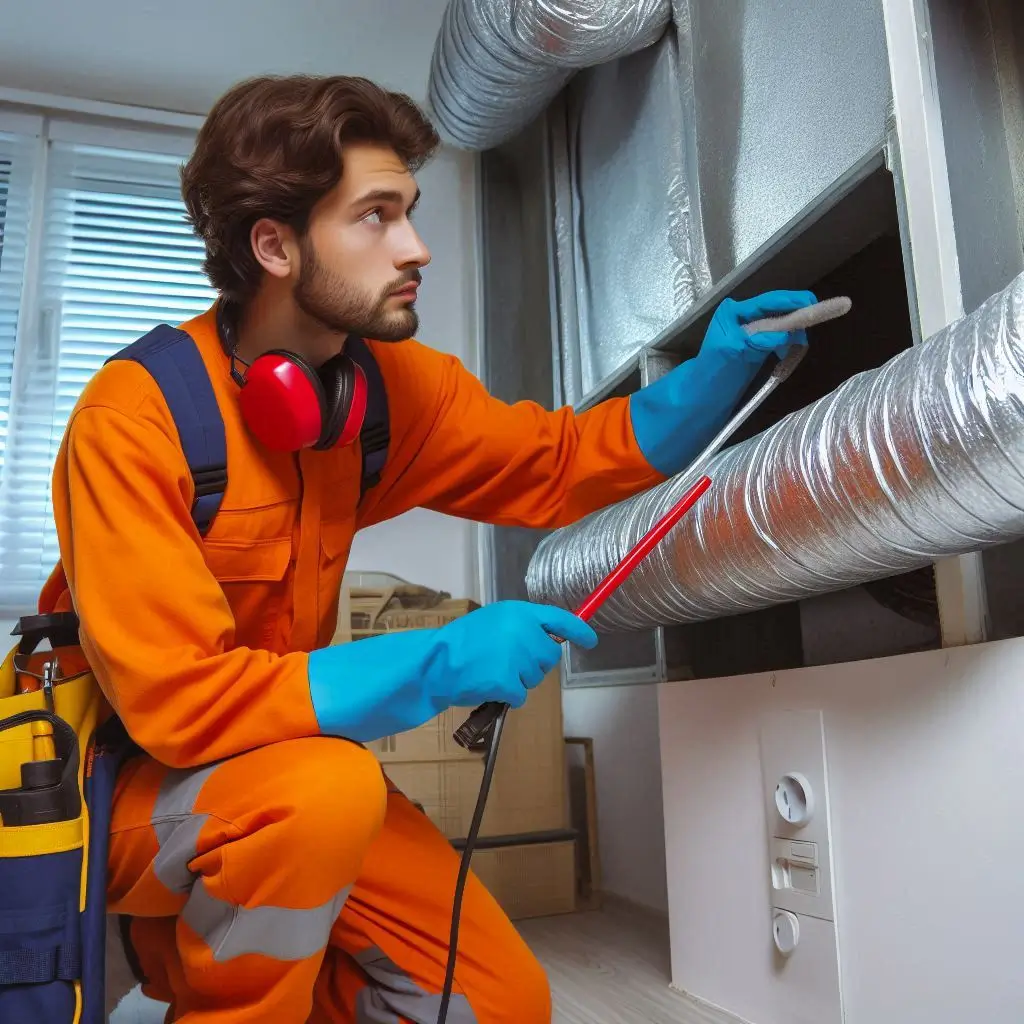
-
Noise Reduction: Regular maintenance helps identify and address components that might be causing excessive noise, such as loose parts or failing motors. Quiet, smooth operation of your HVAC system enhances overall comfort and reduces disruptions in your home or office.
-
Healthier Environment: Clean air filters, ducts, and coils contribute to a healthier indoor environment. With allergens, dust, and pollutants removed, you can enjoy cleaner, fresher air, which is essential for people with asthma, allergies, or other respiratory conditions.
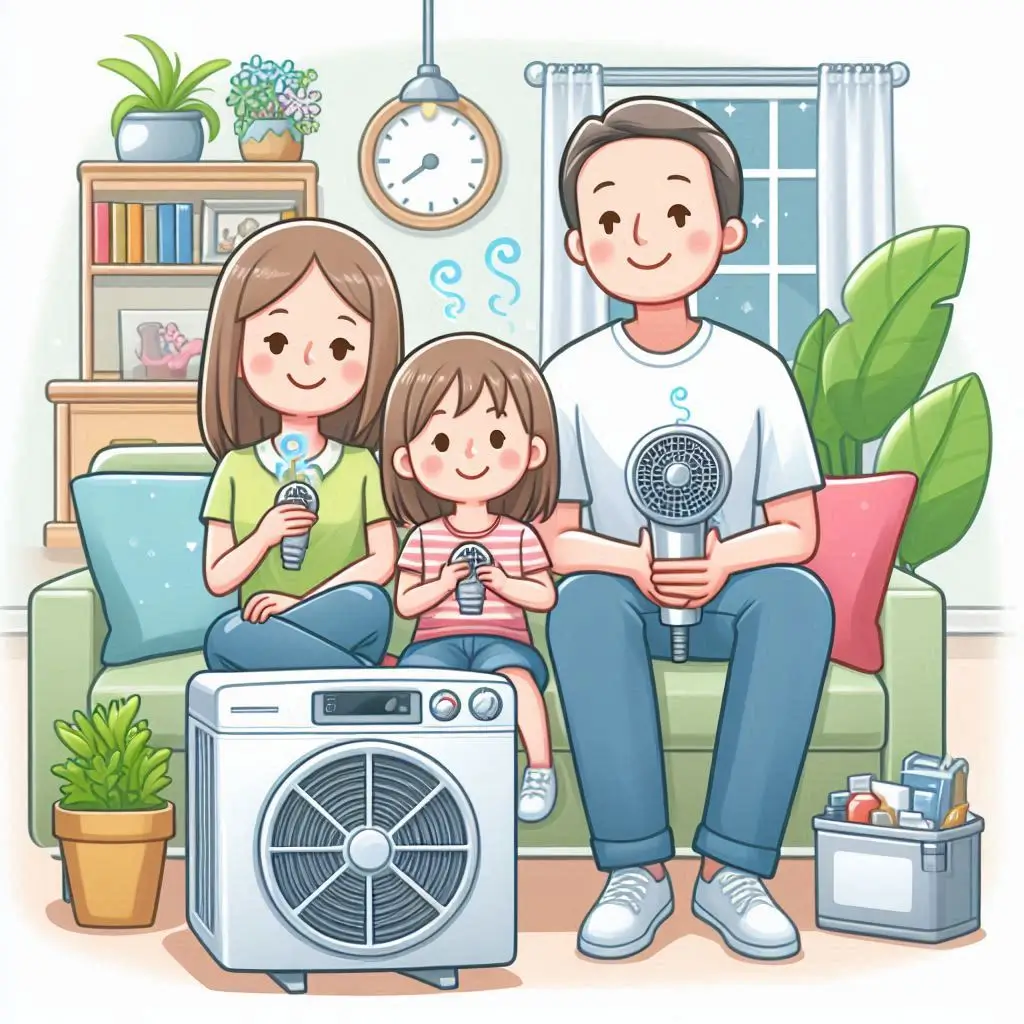
Common HVAC Problems That Require Professional Maintenance
HVAC systems, both heating and cooling, play a crucial role in maintaining comfort in your home or business. However, like all mechanical systems, they are susceptible to wear and tear over time. Regular professional maintenance is essential for identifying and addressing common HVAC problems before they escalate into costly repairs or system failures. In this section, we will discuss some of the most common HVAC issues that require professional attention to ensure your system continues to operate efficiently and effectively.
AC System Issues
Air conditioning (AC) systems are essential for cooling your home during hot weather, but they can experience a variety of issues that may compromise their efficiency or even cause a complete breakdown. Here are some common AC problems that often require professional maintenance:
1. Poor Airflow or Low Cooling Performance
One of the most common AC problems is poor airflow or insufficient cooling. This issue can be caused by several factors, including clogged air filters, dirty evaporator coils, or blocked ductwork. When the airflow is restricted, your system has to work harder to cool your home, leading to higher energy bills and a decrease in overall system performance.
- Solution: Regularly replacing or cleaning air filters and scheduling routine system cleanings can help prevent these issues and ensure that your AC operates efficiently.
2. Frozen Coils
Frozen evaporator coils are a common issue in air conditioning systems. When the coils freeze, the system cannot absorb heat properly, causing the AC to stop cooling effectively. This is usually a result of low refrigerant levels, dirty filters, or restricted airflow.
- Solution: A professional HVAC technician will inspect and clean the coils, check refrigerant levels, and replace or clean air filters to ensure the system runs smoothly.
3. Refrigerant Leaks
If your AC system is low on refrigerant, it will struggle to cool your home, and the system may even shut down completely. Leaks in the refrigerant line can occur over time, causing a drop in refrigerant levels and a decrease in cooling efficiency.
- Solution: A licensed HVAC technician will locate and repair the refrigerant leak, then recharge the system to the correct levels.
4. Thermostat Issues
An improperly calibrated thermostat can lead to inconsistent temperature control, making it difficult to maintain a comfortable indoor environment. A malfunctioning thermostat may also cause the system to run inefficiently, leading to higher energy consumption.
- Solution: HVAC professionals can recalibrate or replace faulty thermostats to ensure accurate temperature regulation.
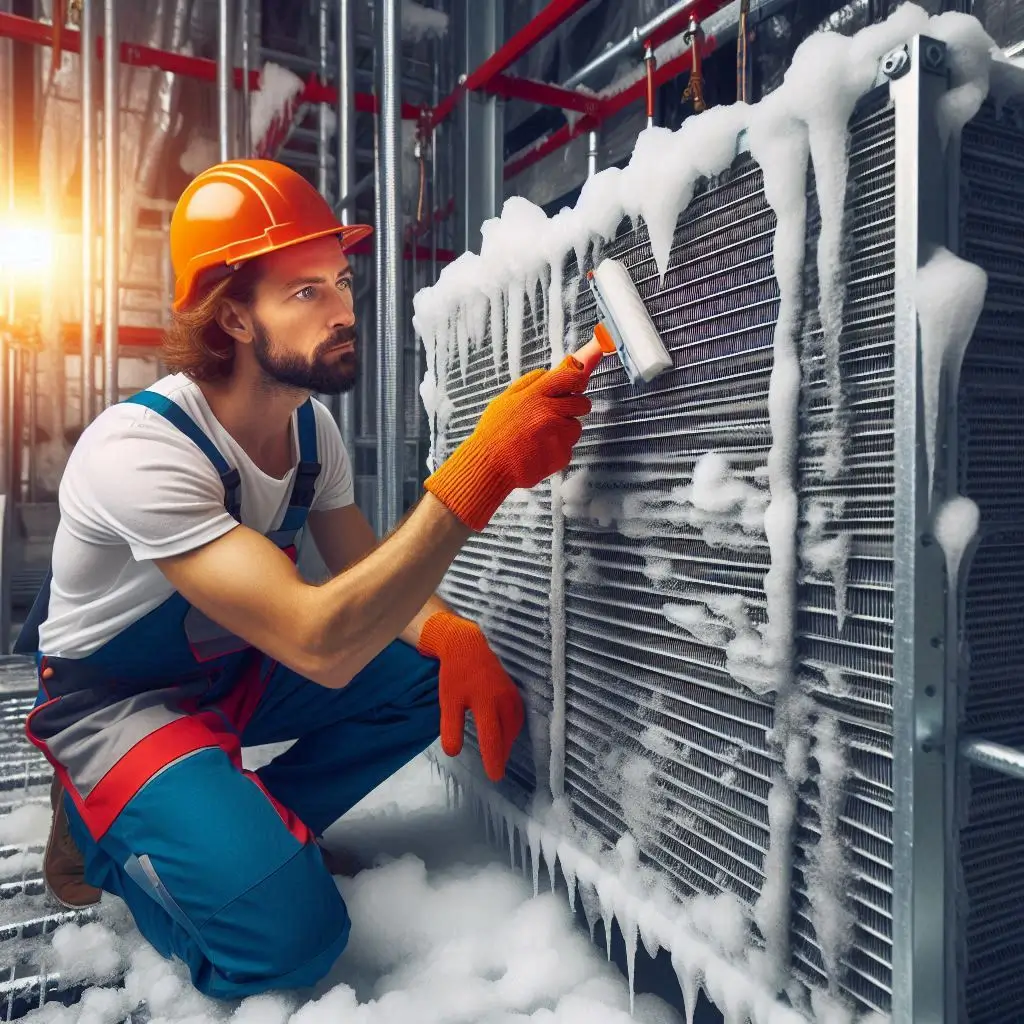
5. Drainage Problems
Air conditioners produce condensation during the cooling process, which is collected and drained away via the condensate line. If the drain is clogged, it can lead to water damage, mold growth, and even system failure.
- Solution: A professional technician will clear the drain lines and check for any signs of water damage to ensure proper drainage.
Heating System Malfunctions
Your heating system is just as crucial as your air conditioning, especially during colder months. However, heating systems also face a variety of issues that require professional intervention. Below are some common heating system malfunctions:
1. Pilot Light or Ignition Problems
A malfunctioning pilot light or ignition system is a common issue in gas heating systems. If the pilot light goes out or the ignition system fails, your furnace won’t be able to produce heat, leaving your home cold.
- Solution: HVAC professionals can clean or replace the pilot light or ignition system and ensure that the gas valve and other components are working properly.
2. Thermostat Malfunctions
Just like in cooling systems, a malfunctioning thermostat can cause heating issues. If the thermostat is not reading temperatures correctly or fails to communicate with the heating system, it may result in inconsistent temperatures or complete failure to heat the home.
- Solution: Technicians can recalibrate, repair, or replace faulty thermostats to ensure they are working correctly and maintain the desired temperature.
3. Dirty or Clogged Air Filters
Air filters in heating systems can become clogged with dust and debris, restricting airflow and causing the system to overheat or fail. Dirty filters also reduce air quality, which can exacerbate allergies or respiratory issues.
- Solution: Professional HVAC technicians can clean or replace air filters to improve airflow and indoor air quality.
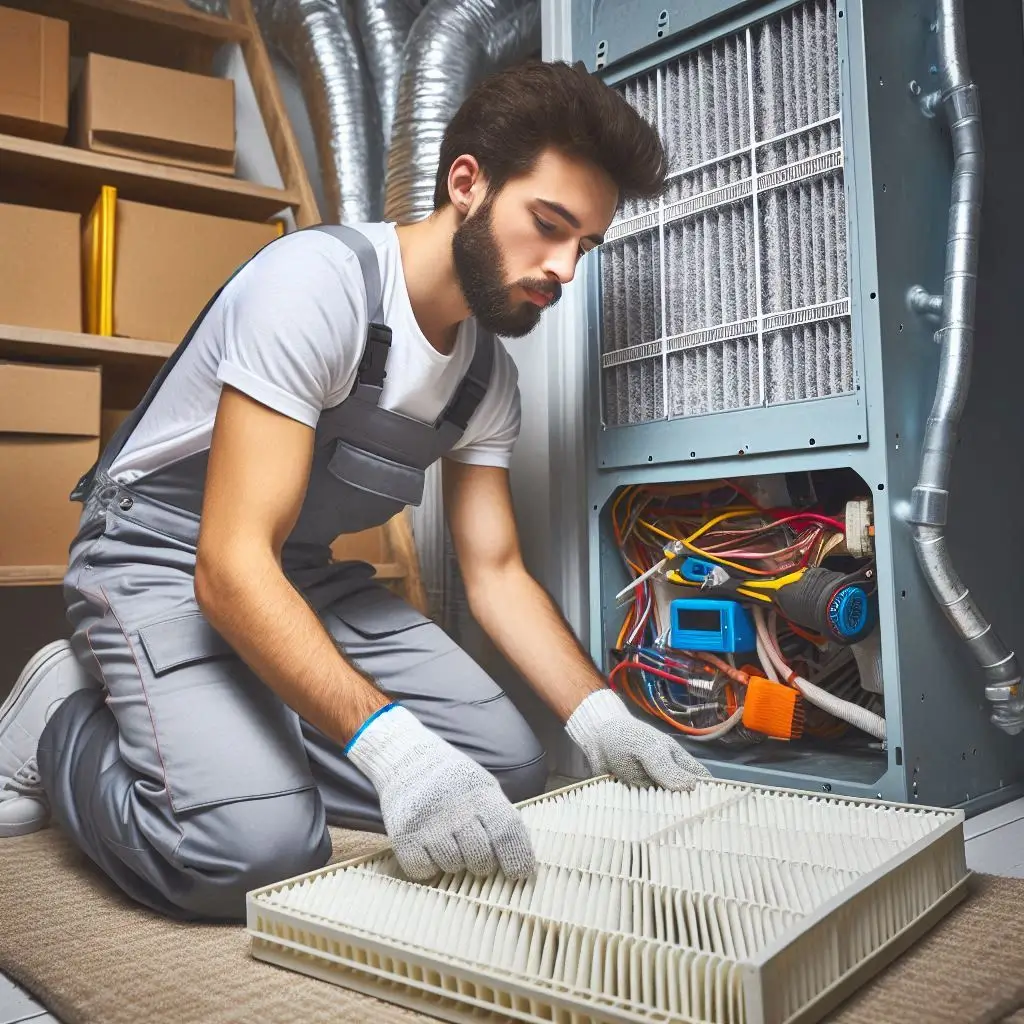
4. Heat Pump Problems
Heat pumps are used to both heat and cool your home, and they are prone to several issues, including refrigerant leaks, frozen coils, or a malfunctioning reversing valve. These problems can cause the system to lose its heating ability or run inefficiently.
- Solution: HVAC technicians can inspect the heat pump, identify the problem, and make the necessary repairs to restore its functionality.
5. Overheating Furnace
If your furnace is constantly turning off or blowing cold air, it may be overheating. This can happen if the furnace’s components are dirty or malfunctioning, causing the system to shut down to prevent further damage.
- Solution: An HVAC technician can clean the furnace, inspect the components, and replace any faulty parts to ensure safe and efficient operation.
6. Strange Noises
Unusual sounds, such as grinding, squealing, or banging noises, can be a sign of mechanical issues within the heating system. These noises often point to issues like worn-out belts, malfunctioning motors, or loose components.
- Solution: A professional technician will diagnose and repair the source of the noise, restoring quiet and efficient operation.
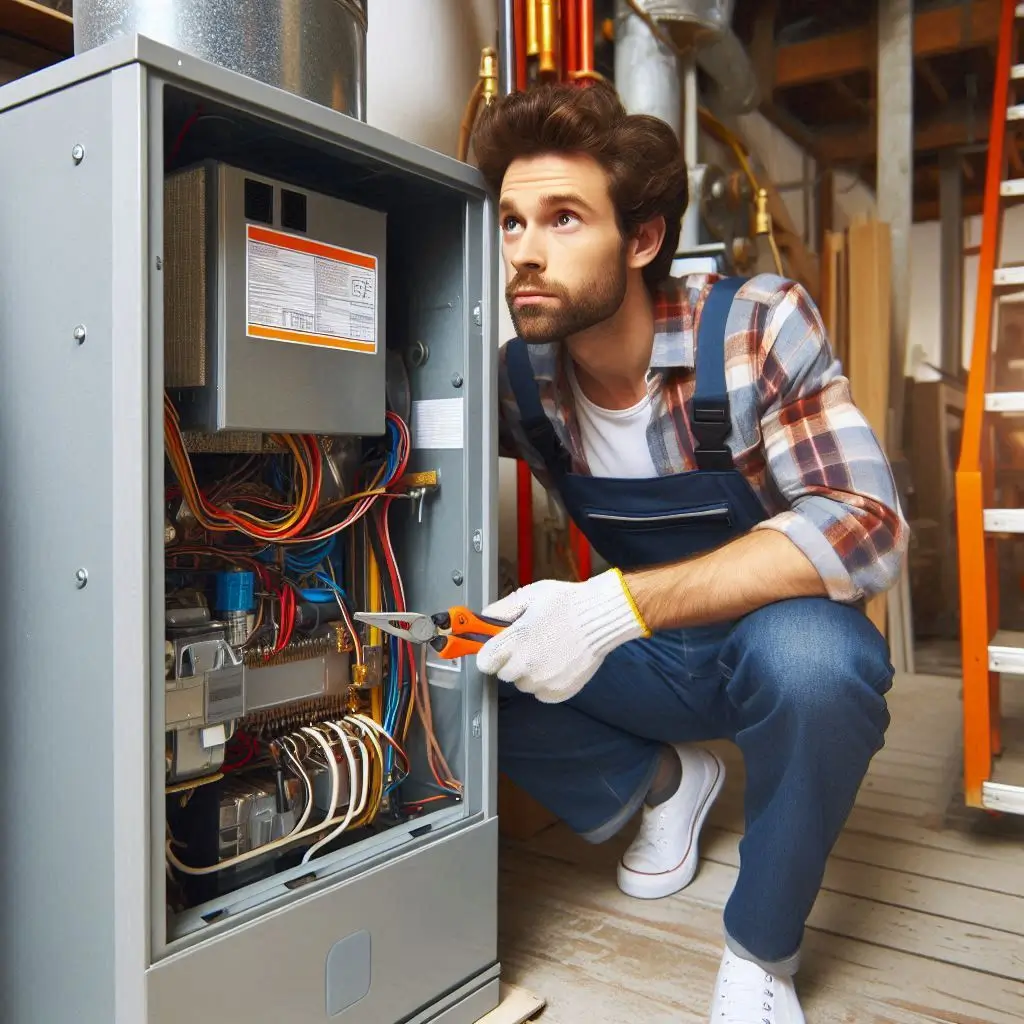
HVAC Maintenance Services Offered by Experts
Professional HVAC maintenance services are essential to ensure that your heating and cooling systems operate at their best year-round. A well-maintained HVAC system runs efficiently, lowers energy costs, and provides consistent comfort. Expert HVAC technicians have the knowledge and tools to perform a variety of essential services, including comprehensive system inspections and preventive maintenance for both heating and cooling systems. This section covers the services offered by HVAC professionals that are critical for maintaining the longevity and efficiency of your HVAC systems.
Comprehensive HVAC System Inspections
A comprehensive HVAC system inspection is an in-depth check of all components that contribute to the heating and cooling performance of your system. This inspection is crucial for identifying potential problems before they develop into costly breakdowns or system failures.
1. Thorough Inspection of Components
HVAC experts begin by inspecting all critical system components, including the compressor, evaporator coils, condenser, thermostat, ductwork, filters, and refrigerant lines. Technicians ensure that every part is functioning as it should and that no components are showing signs of wear and tear.
- Why it’s Important: Regular inspections help detect minor issues before they become significant problems that could lead to expensive repairs or system replacements.
2. Checking for Leaks and Blockages
HVAC professionals also check for refrigerant leaks, airflow blockages, or duct leaks that can reduce system efficiency. For instance, clogged ducts can restrict airflow, causing the system to overwork, resulting in higher energy costs and a shorter lifespan.
- Why it’s Important: Leak detection ensures that your system isn’t losing energy, preventing wasted energy and maintaining the system’s efficiency.
3. Inspecting for Safety Issues
During a system inspection, safety is a top priority. Professionals will check for any issues that could lead to dangerous conditions, such as gas leaks, carbon monoxide buildup, or electrical hazards.
- Why it’s Important: Regular safety checks ensure the safety of your home and family, preventing potentially hazardous situations.
4. Cleaning and Lubrication
Dust, dirt, and debris can accumulate in various HVAC system parts. HVAC technicians clean key components, such as the evaporator and condenser coils, fans, and filters, and lubricate moving parts, like the fan and motor.
- Why it’s Important: Regular cleaning and lubrication reduce the wear and tear on components, improving system efficiency and extending its lifespan.
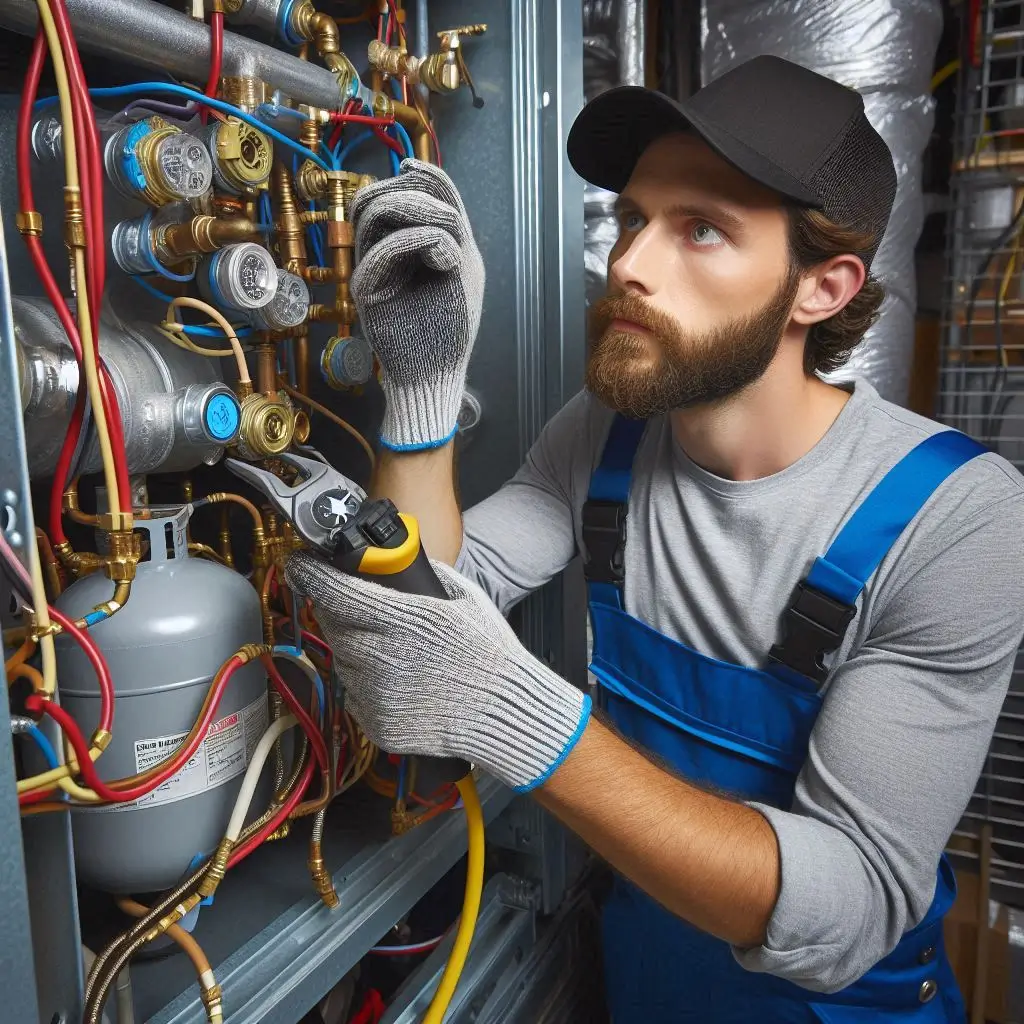
Preventive Maintenance for Heating and Cooling Systems
Preventive maintenance is essential for keeping both heating and cooling systems running at peak efficiency. HVAC systems work hard to maintain a comfortable indoor climate, and routine preventive care can prevent breakdowns and costly repairs while improving overall system performance. Preventive maintenance includes a variety of tasks designed to keep your HVAC system functioning properly throughout the year.
1. Regular Filter Replacement
The filters in your HVAC system trap dust, dirt, and allergens, but over time, they become clogged and less effective. HVAC technicians will replace dirty filters with new, clean ones to improve airflow and prevent unnecessary strain on the system.
- Why it’s Important: Clean filters reduce the risk of overheating and maintain healthy indoor air quality by reducing allergens, dust, and pet dander.
2. Checking and Calibrating the Thermostat
A well-calibrated thermostat ensures your HVAC system maintains the desired temperature accurately. Professionals will check the calibration, and if needed, recalibrate or replace the thermostat to avoid inaccurate readings that could result in inconsistent temperatures.
- Why it’s Important: A properly calibrated thermostat prevents overworking your system, ensuring energy savings and consistent comfort.
3. Cleaning Coils and Drains
Air conditioning and heating systems have evaporator and condenser coils that can accumulate dirt over time. These coils are essential for heat exchange. Dirty coils can lead to system inefficiency, increased energy consumption, and reduced cooling/heating performance. Similarly, HVAC technicians clean and inspect the condensate drains to ensure proper drainage of moisture from the system.
- Why it’s Important: Clean coils enhance heat transfer and efficiency, and clear drains prevent moisture buildup, which can lead to mold growth and system malfunction.
4. Inspecting Ductwork
Inspecting the ducts for leaks or blockages is another critical aspect of preventive HVAC maintenance. Leaky ducts can allow conditioned air to escape, making it harder for the system to maintain the desired temperature.
- Why it’s Important: Sealing ducts ensures that the conditioned air is delivered where it’s needed, improving system efficiency and indoor comfort.
5. Checking Refrigerant Levels
Refrigerant is essential for cooling and dehumidifying the air, and low refrigerant levels can indicate a leak or an issue with the system. HVAC experts check refrigerant levels and recharge them if necessary, ensuring the system operates optimally.
- Why it’s Important: Proper refrigerant levels are necessary for the system to cool effectively. Low refrigerant can cause strain on the compressor, leading to expensive repairs.
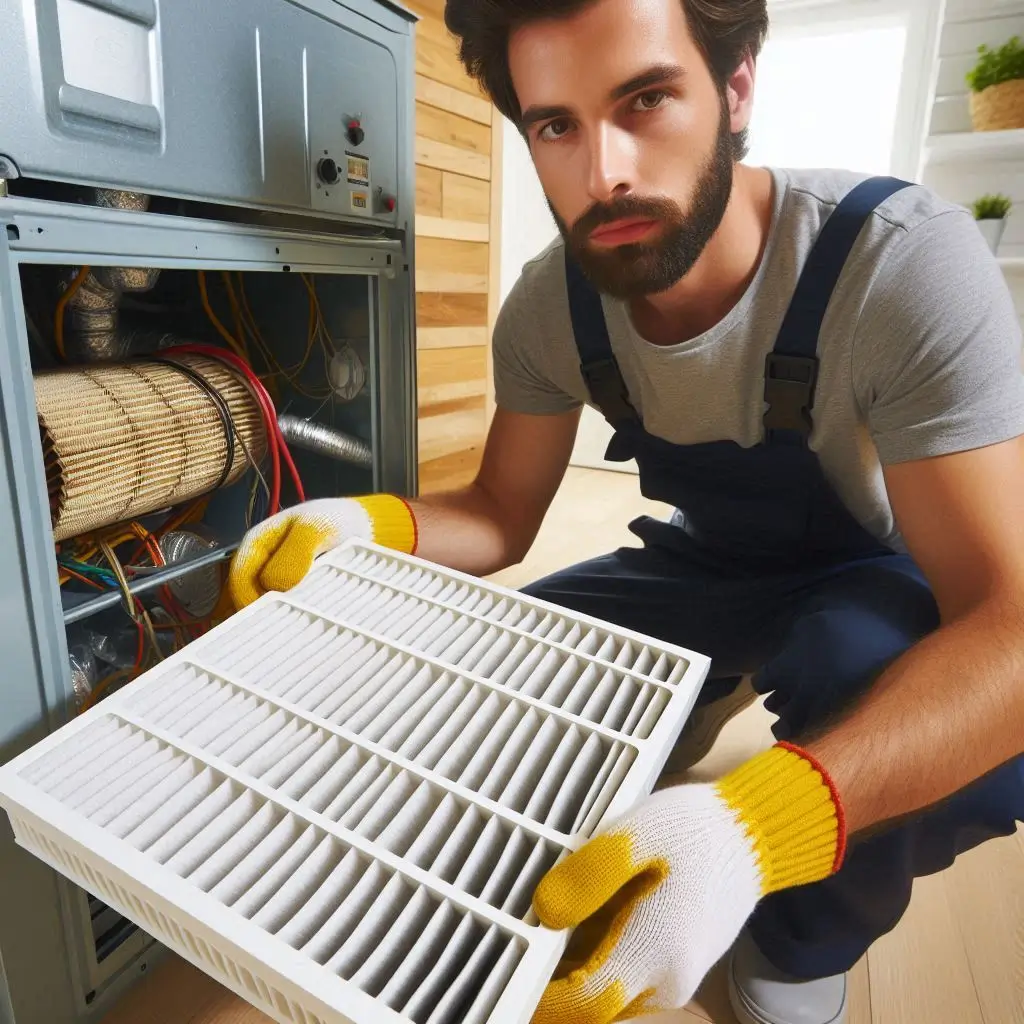
6. Lubricating Motors and Belts
HVAC systems contain motors and belts that need regular lubrication to reduce friction and prevent breakdowns. Over time, parts like the fan and motor can become worn out, which can cause inefficiencies or system failure.
- Why it’s Important: Lubrication reduces friction and ensures smooth operation, extending the lifespan of motors and belts.
In conclusion, regular HVAC maintenance services provided by professionals are essential for keeping your system running efficiently and reliably. Comprehensive HVAC system inspections and preventive maintenance tasks such as cleaning, lubricating, and checking for leaks ensure that your system operates at its best. By scheduling routine maintenance, you not only improve the system’s performance but also extend its lifespan, lower energy costs, and increase comfort in your home or business. Always rely on certified HVAC technicians to perform these services to ensure safety, efficiency, and optimal performance.
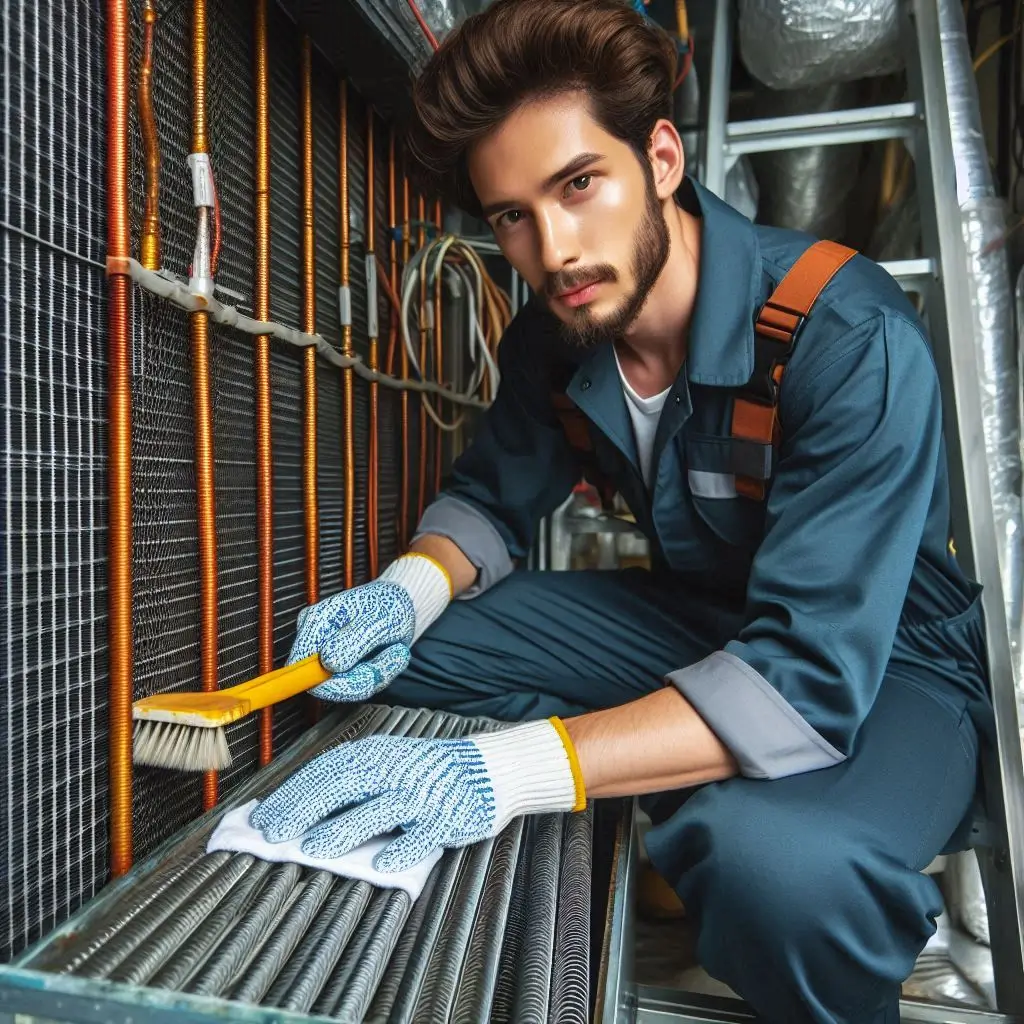
How to Schedule HVAC Maintenance Services in Your Local Area
Scheduling HVAC maintenance services in your local area is an essential step in ensuring that your heating and cooling systems operate efficiently year-round. Regular maintenance helps prevent costly repairs, improves energy efficiency, and ensures your HVAC system runs smoothly. Fortunately, scheduling HVAC maintenance doesn’t have to be complicated. Below, we will guide you through easy steps to book HVAC services near you and provide tips on when to schedule maintenance for optimal system performance.
Easy Steps to Book HVAC Maintenance Near You
Scheduling HVAC maintenance in your local area can be simple if you follow these easy steps. Whether you’re looking to schedule a seasonal tune-up or a comprehensive system check, following these steps will ensure you book the right services at the right time.
1. Research Local HVAC Service Providers
Start by researching local HVAC maintenance companies near you. Use online search engines, reviews, and referrals from friends and family to identify trustworthy HVAC contractors. Look for companies that have good ratings, years of experience, and certifications.
- Why it’s Important: Reliable HVAC contractors provide professional service and ensure your system is properly maintained, reducing the risk of future breakdowns and inefficiencies.
2. Check for Availability and Offerings
Once you have identified a few HVAC companies, check their availability to see if they can meet your schedule. Some companies offer emergency services, while others may have specific days for scheduled maintenance. Many contractors also offer flexible service plans, so be sure to inquire about those options.
- Why it’s Important: Flexible scheduling options ensure you get the maintenance you need without disrupting your routine or waiting for long periods.
3. Request an Estimate or Service Quote
Most HVAC companies will offer a free estimate or quote for the services required. Ensure that the quote includes a breakdown of the maintenance tasks they will perform and any potential costs. A clear and transparent estimate can help avoid unexpected costs.
- Why it’s Important: Understanding the costs beforehand allows you to make informed decisions, avoiding hidden charges and ensuring you’re getting the best value for your investment.
4. Book the Appointment Online or Over the Phone
Once you’ve reviewed the options and are comfortable with the quote, you can book your appointment. Many HVAC companies provide easy online booking through their websites or through customer service phone lines. Ensure to confirm the date and time of the appointment with the service provider.
- Why it’s Important: Booking your appointment quickly ensures timely maintenance, preventing potential breakdowns and keeping your system running efficiently.
5. Prepare Your Home or Business for the Appointment
Before the technician arrives, ensure the area around your HVAC system is clear of obstacles. This will help the technician perform their inspection or maintenance more efficiently. It’s also helpful to note any specific issues you’ve been noticing with the system, as this can aid the technician in troubleshooting.
- Why it’s Important: A clean and clear space allows for a faster, more effective service, reducing the time required for the maintenance.

When to Schedule Regular HVAC Maintenance for Optimal Performance
Scheduling HVAC maintenance at the right time is crucial for ensuring your system performs efficiently and lasts longer. Regular maintenance should be done at key intervals throughout the year to keep your HVAC system in top condition. Here’s when you should consider scheduling regular HVAC maintenance.
1. Before the Start of Peak Seasons
The best time to schedule HVAC maintenance is before the start of the summer or winter season. In the summer, air conditioners work hard to cool your home, and in the winter, your heater works overtime to keep the indoor temperature comfortable. Scheduling maintenance in the spring (for air conditioners) or fall (for heating systems) ensures your system is ready to tackle these heavy workloads.
- Why it’s Important: Pre-season maintenance helps identify and address any issues before your HVAC system is under heavy use. This reduces the likelihood of system failure during extreme weather conditions.
2. Annually for General Maintenance
Even if you don’t experience any specific issues with your HVAC system, annual maintenance is necessary to keep it running smoothly. During an annual maintenance visit, the technician will perform a comprehensive inspection, clean the system, replace filters, and check refrigerant levels.
- Why it’s Important: Regular yearly maintenance helps extend the lifespan of your HVAC system and ensures it operates at peak efficiency, reducing energy costs and preventing unexpected repairs.
3. When You Notice Decreased Efficiency
If your HVAC system seems to be working harder than usual to maintain the desired temperature, it may be time to schedule maintenance. Signs such as increased energy bills, inconsistent temperatures, or strange noises are indications that your system may need a tune-up.
- Why it’s Important: Addressing issues early can prevent costly repairs and ensure your HVAC system continues to function at its best. A decrease in efficiency could be a sign that parts need attention or cleaning.
4. After Major Repairs or Upgrades
If your HVAC system has undergone a major repair or upgrade, scheduling follow-up maintenance is a good idea. This ensures that everything is working properly and that the new components are properly integrated into the system.
- Why it’s Important: Post-repair or post-upgrade maintenance helps ensure that the system operates as intended, preventing problems from developing after significant changes have been made.
5. If Your HVAC System is Over 10 Years Old
If your HVAC system is over 10 years old, it’s crucial to schedule more frequent maintenance. Older systems are more prone to wear and tear, and regular checks can help extend their lifespan and prevent expensive replacements.
- Why it’s Important: Regular maintenance of older systems can improve efficiency, reduce the risk of breakdowns, and potentially delay the need for an expensive replacement.
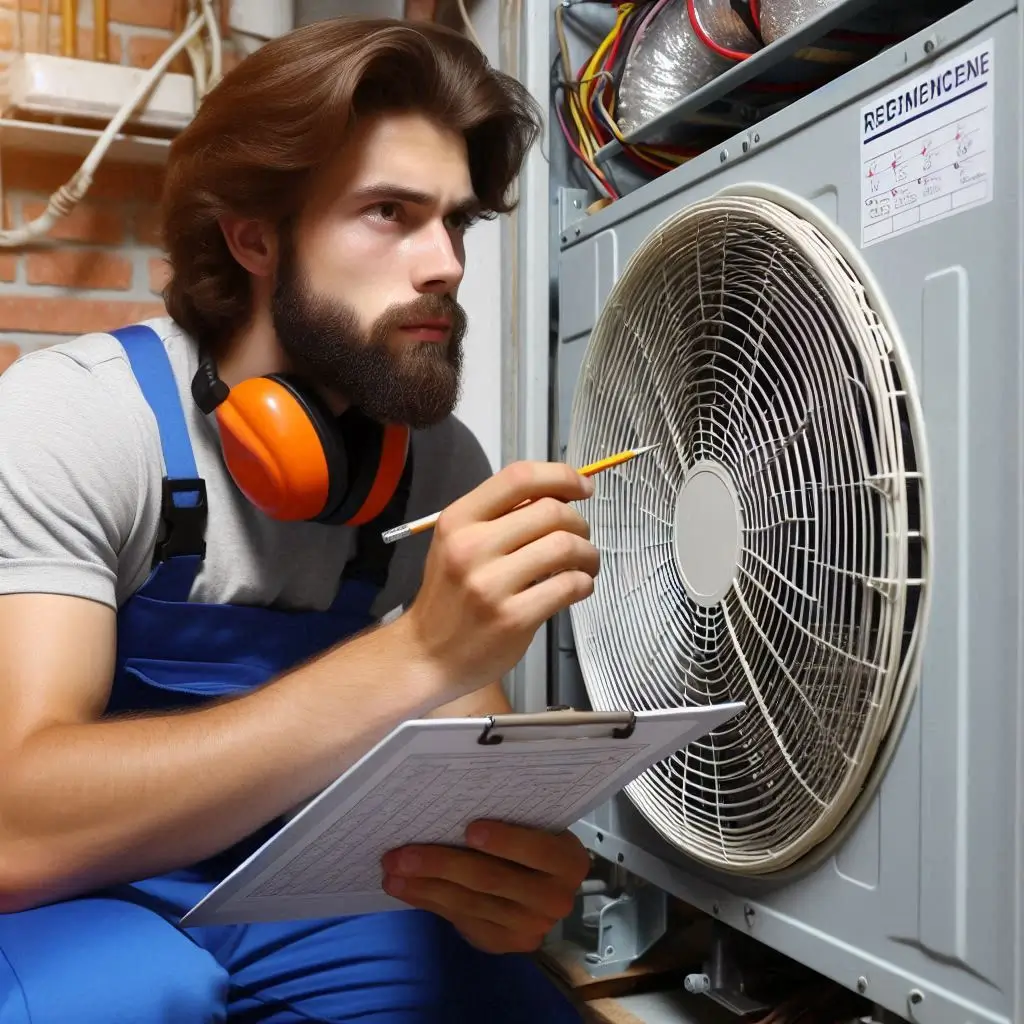
In conclusion, scheduling HVAC maintenance in your local area doesn’t have to be complicated. By following simple steps, such as researching local service providers, checking availability, and requesting quotes, you can ensure that your HVAC system is well-maintained and ready for the upcoming seasons. Regular maintenance should be scheduled before peak seasons, annually for general upkeep, and whenever you notice signs of decreased efficiency. By taking proactive measures, you can ensure that your HVAC system performs efficiently, saves on energy costs, and lasts longer.
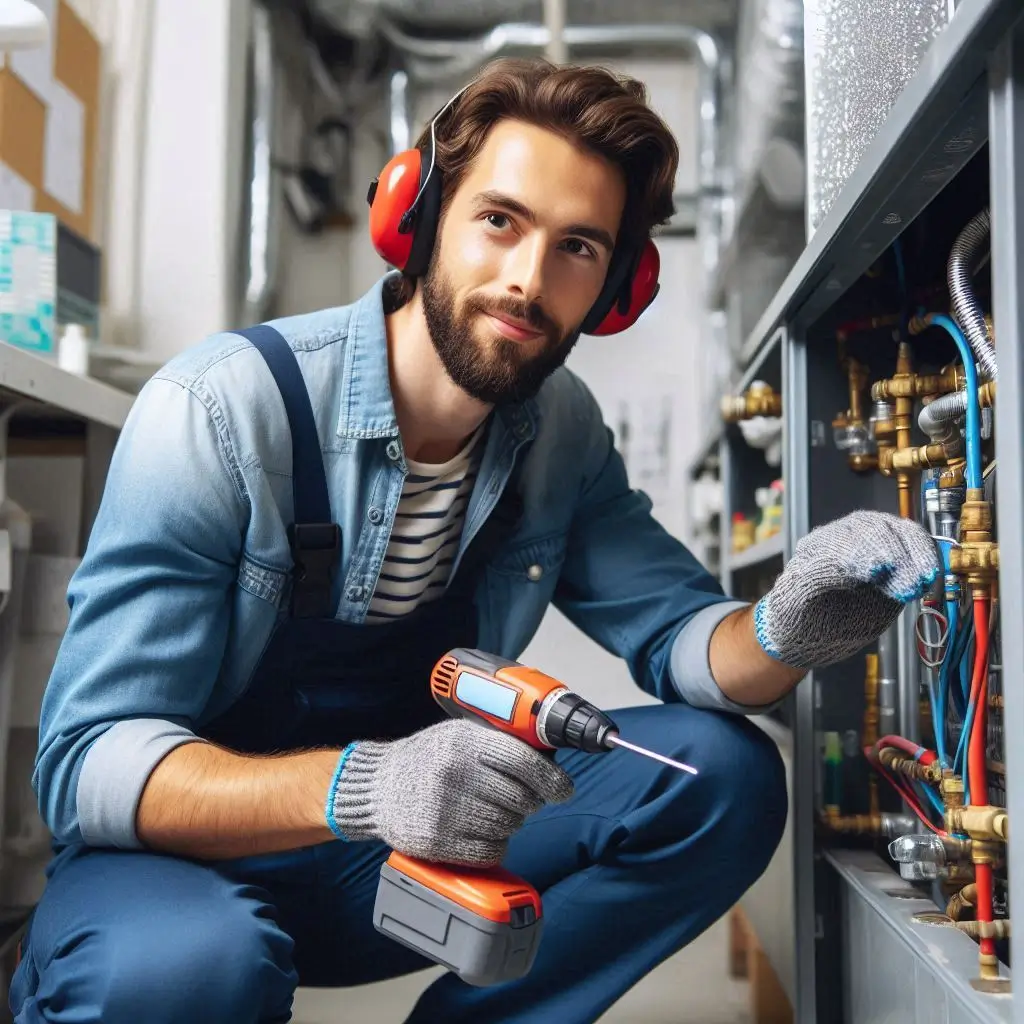
FAQ: HVAC Maintenance Services Near You
In this section, we’ll address some of the most frequently asked questions about HVAC maintenance services. These FAQs will help you better understand the importance of regular HVAC upkeep, when to schedule maintenance, and how to choose the best service providers in your area. By providing clear, concise, and informative answers, this section will boost your SEO ranking and ensure your audience has the knowledge they need to keep their HVAC systems running smoothly.
1. What is HVAC Maintenance?
HVAC maintenance refers to the routine service performed on heating, ventilation, and air conditioning systems to ensure that they are operating at peak efficiency. Regular HVAC maintenance typically involves cleaning components, inspecting the system for any potential issues, and replacing parts like filters, lubricating moving parts, and checking refrigerant levels. This process helps ensure the longevity of the system and its energy efficiency, saving homeowners on utility costs and preventing costly breakdowns.
- Why it’s Important: Regular maintenance keeps your HVAC system running smoothly, reduces energy consumption, extends its lifespan, and helps avoid expensive repairs or replacements.
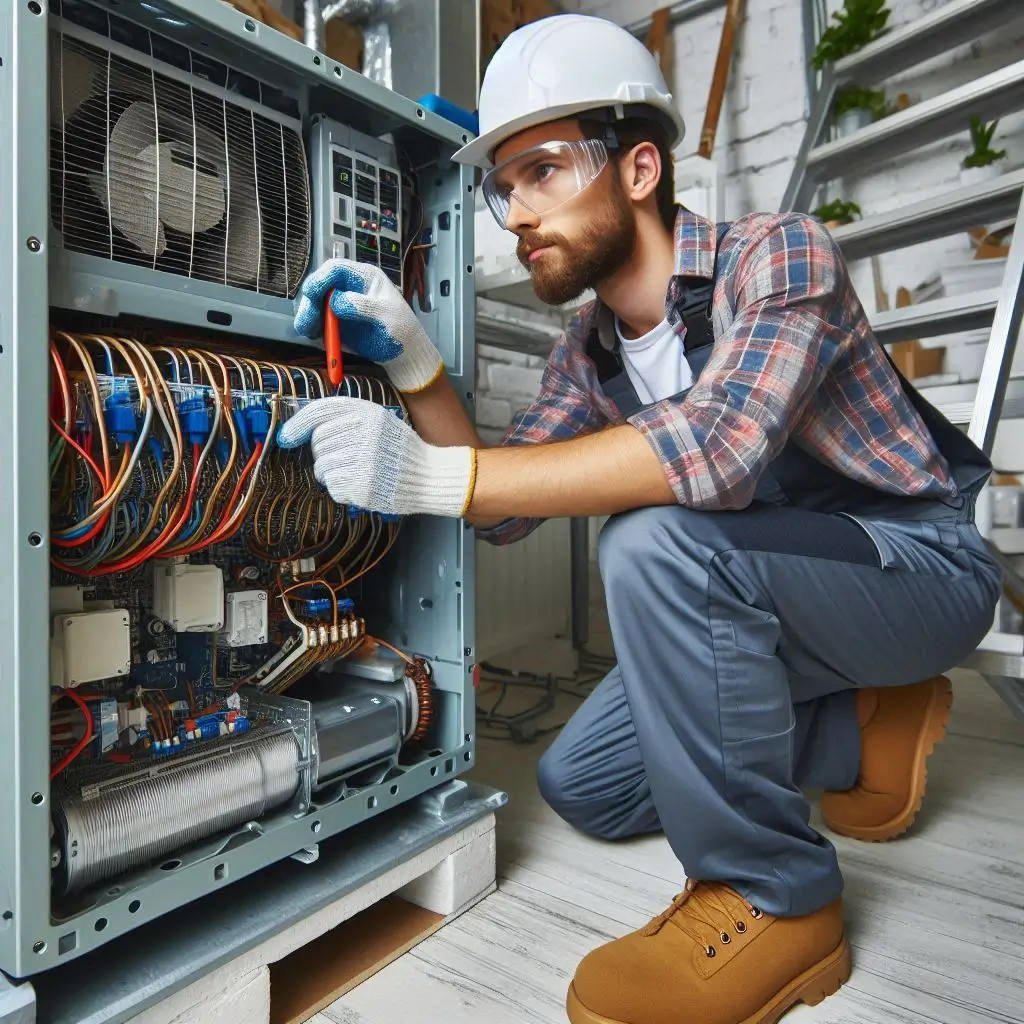
2. How Often Should HVAC Maintenance Be Performed?
HVAC systems should ideally be serviced at least once a year, typically before the peak usage seasons—spring for cooling systems (air conditioners) and fall for heating systems (furnaces or heat pumps). However, some systems may benefit from more frequent maintenance depending on factors like age, usage, and the environment. For instance, if you live in an area with high humidity or dusty conditions, you may need more frequent checks.
- Why it’s Important: Annual maintenance ensures that your HVAC system is ready for heavy use, preventing mid-season breakdowns and ensuring that your home remains comfortable year-round.
3. Can I Perform HVAC Maintenance on My Own?
While there are certain maintenance tasks that homeowners can do themselves, such as replacing air filters or cleaning vents, it is highly recommended to leave comprehensive HVAC maintenance to professionals. HVAC systems contain complex components that require specialized knowledge and tools to inspect and service correctly. Attempting to repair or maintain these systems without proper training can lead to further damage or safety hazards.
- Why it’s Important: Professional technicians have the expertise to properly diagnose and fix issues, preventing costly mistakes and ensuring your system operates efficiently.
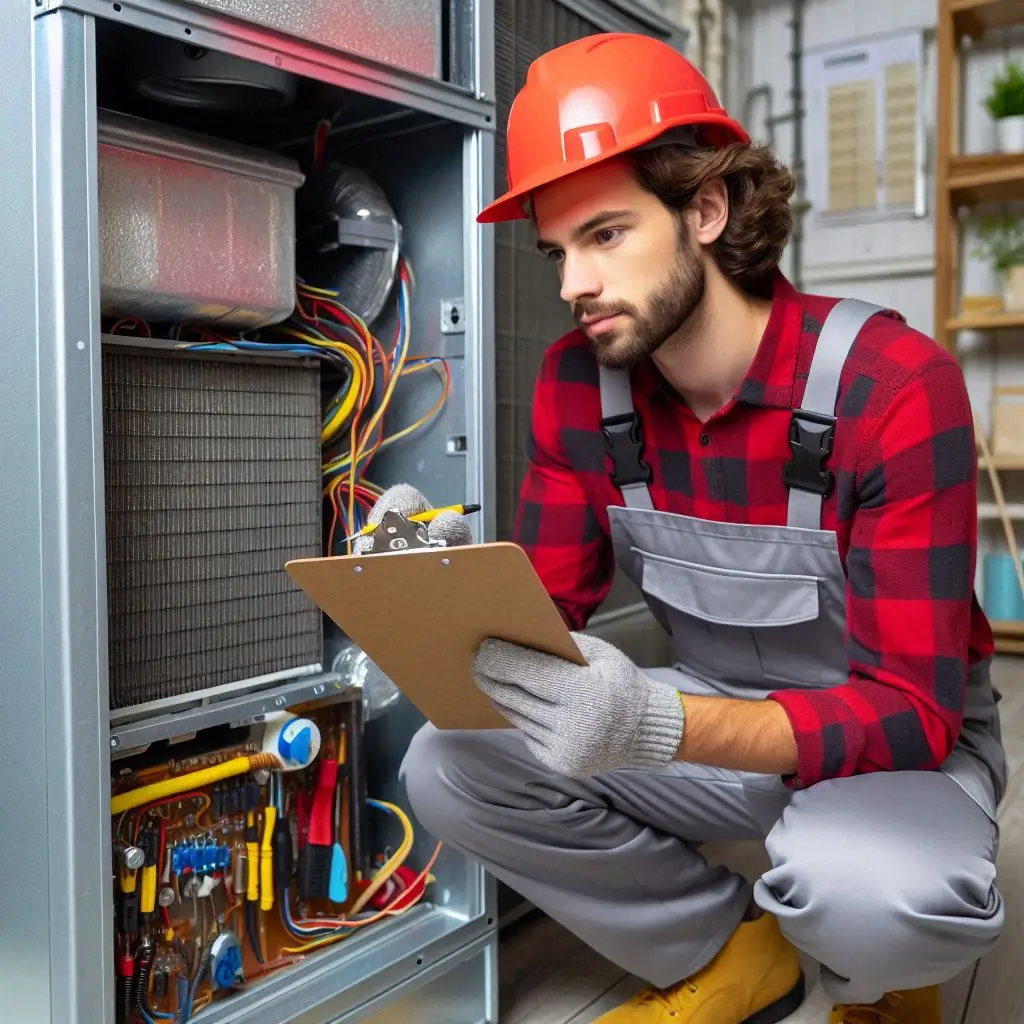
4. How Can I Find Reliable HVAC Maintenance Services Near Me?
To find the best HVAC maintenance services in your area, start by conducting a local search online and looking at customer reviews. Focus on companies with good reputations, certified technicians, and years of experience. It’s also helpful to ask for recommendations from friends or family who have had positive experiences. Additionally, many HVAC companies offer free quotes or consultations, which can help you compare services and prices before making a decision.
- Why it’s Important: Choosing a reputable HVAC company ensures high-quality service, safety, and satisfaction, which will contribute to the longevity and efficiency of your HVAC system.
5. What Are the Benefits of Regular HVAC Maintenance?
The main benefits of regular HVAC maintenance include:
-
Improved Efficiency: Clean and properly maintained systems consume less energy, reducing your utility bills.
-
Prolonged System Life: Regular maintenance helps to prevent wear and tear, extending the life of your HVAC system.
-
Fewer Repairs: Regular checks help catch small issues before they become large, costly repairs.
-
Better Indoor Air Quality: Cleaning air filters, ducts, and other components improves the air quality in your home.
-
Why it’s Important: These benefits not only improve the comfort and air quality in your home but also help you save money in the long run.
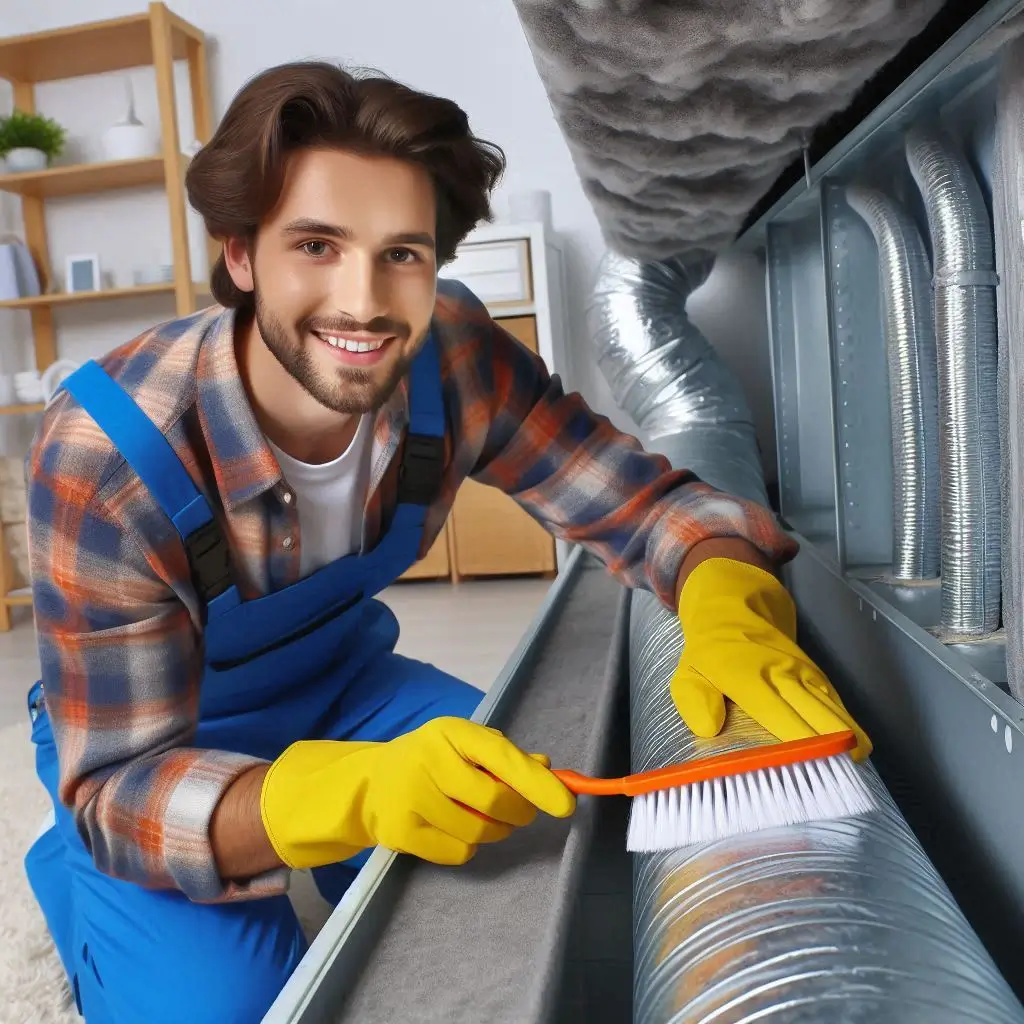
6. What Should Be Included in an HVAC Maintenance Service?
A typical HVAC maintenance service will include the following tasks:
-
Inspection of major components: Thermostat, condenser, evaporator, ducts, and air filters.
-
Cleaning of filters and coils: To improve airflow and system efficiency.
-
Lubrication of moving parts: Fans and compressors to reduce wear and tear.
-
Check of refrigerant levels: Ensuring the system is operating at the optimal level.
-
Calibration of thermostat: Ensuring accurate temperature readings and comfort.
-
Why it’s Important: These tasks ensure that your HVAC system is running at its best, helping to avoid future breakdowns and inefficiencies.
7. What Are the Common Signs That My HVAC System Needs Maintenance?
Look for the following signs that your HVAC system may need maintenance:
-
Inconsistent temperatures: Some rooms may be warmer or colder than others.
-
Strange noises: Grinding, rattling, or buzzing sounds indicate potential issues.
-
Increased energy bills: If your energy costs rise without reason, it could be due to inefficient HVAC performance.
-
Frequent cycling: If your HVAC system turns on and off frequently, it may be struggling to maintain temperature.
-
Why it’s Important: Identifying problems early and scheduling maintenance can prevent larger, more expensive issues from developing.
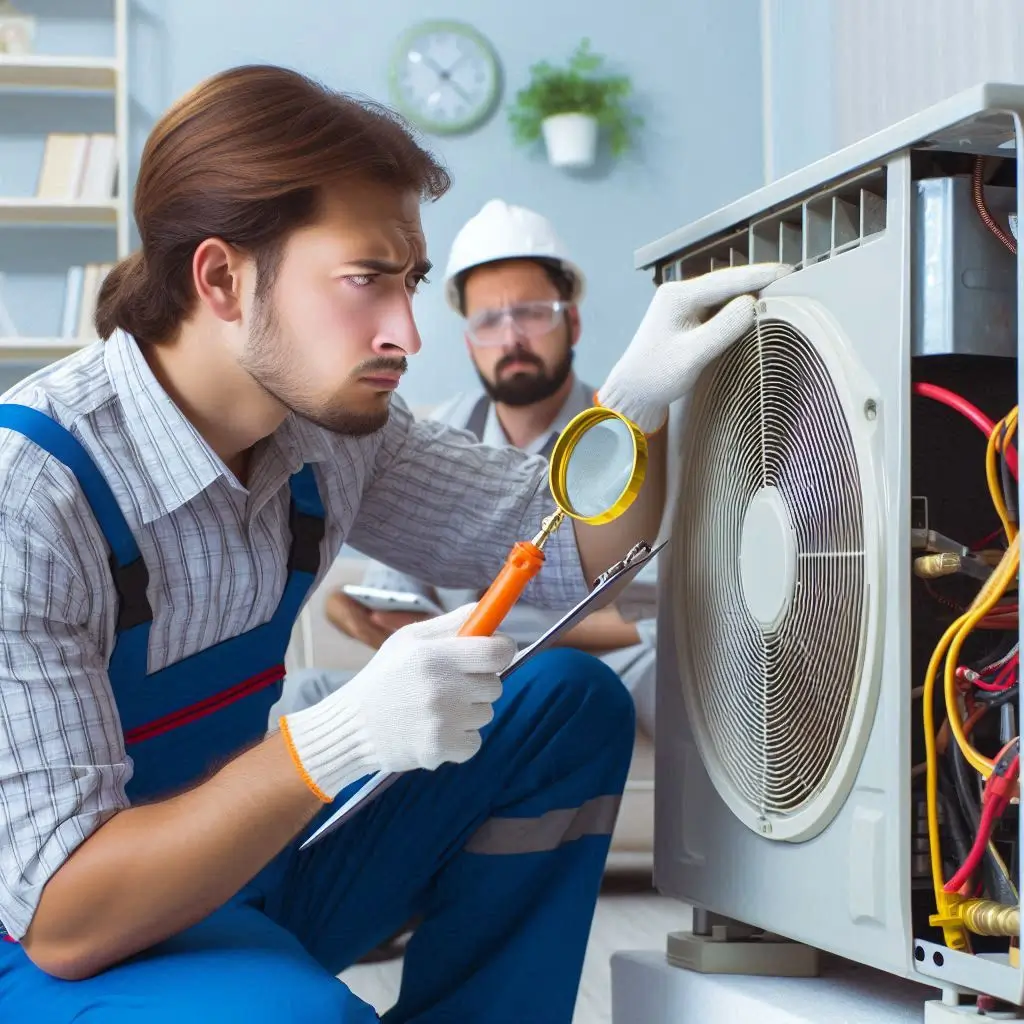
Conclusion:
In conclusion, regular HVAC maintenance is crucial for ensuring the long-term performance, efficiency, and reliability of your heating and cooling systems. Whether you’re scheduling routine maintenance, addressing common HVAC issues, or seeking professional services near you, prioritizing these tasks will help you save on energy costs, prevent major repairs, and improve the comfort and air quality in your home. By following the best practices for maintenance and choosing a trusted local service provider, you can enjoy a smoothly running HVAC system year-round. Don’t wait for your system to break down—schedule your HVAC maintenance today and experience the benefits of a well-maintained system for years to come.

